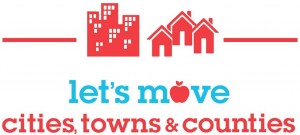LMCTC White House Event - Community Spotlights
On September 16, 2015, the National League of Cities will join First Lady Michelle Obama at the White House to celebrate the accomplishments of communities across the country who are participating in Let’s Move! Cities, Towns and Counties. LMCTC is a key part of the Let’s Move! initiative and helps local elected officials, their staff and communities ensure all children grow up healthy and have the ability to reach their full potential. Below is a sampling of the trailblazing steps communities are taking to improve access to healthy affordable food and provide opportunities for physical activity for all children.
Allentown, Pa.
Under the leadership of Mayor Ed Pawlowski, the city of Allentown is tackling childhood obesity using a variety of approaches. An innovative aspect of Allentown’s work is its “Fruits and Veggies on the Move” program, a truck that brings free fruits and vegetables to playground and recreation sites managed by the city’s Department of Parks & Recreation. Since July of 2011, the truck has served an estimated 10,000 children and adults.
The city of Allentown also partners with youth-serving organizations, such as child care providers and recreation programs, to ensure that city programs encourage best practices, such as reduced screen time for kids and 60 minutes of physical activity per day for kids and adults. Allentown’s Health Bureau, in collaboration with other city departments, seeks to promote environmental, policy and systems changes that support healthy eating and increased physical activity in communities, schools, childcare centers and worksites. Additionally, efforts are underway to build a culture of walking and biking in Allentown. These efforts have resulted in Safe Routes to School Programs, crosswalk upgrades, additional bike racks and bike lane markings.
Columbus, Ohio
Mayor Michael B. Coleman has taken great strides in Columbus to increase opportunities for physical activity and promote healthy eating. New parks and recreation centers, parklets, an Open Streets initiative, new bike paths, outdoor fitness equipment and numerous natural play spaces help city departments make the healthy choice the easy choice for residents.
Columbus is a national leader in implementing walkability initiatives to improve public health and quality of life at a citywide level, engaging in partnerships with city agencies responsible for land use and transportation planning as well as neighborhood groups seeking change. The city has also created numerous neighborhood maps highlighting great places to walk, and implemented innovating programming such as Columbus Art Walks and Landmark Talks, Walk With A Doc and Safe Routes to School initiatives. The Columbus Public Health Department has also worked with more than 100 child care centers to engage parents, provide training and support for more than 400 new policies for child care centers on topics such as physical activity, screen time and nutrition. In addition, a key partnership with Columbus Public Schools has resulted in universal school breakfast and lunch, expanded summer meal locations and healthier vending.
Fort Collins, Colo.
Fort Collins has institutionalized the goals of Let’s Move! through ongoing programs and sustained partnerships. The city’s successes include diverse and inclusive recreational opportunities, a robust multi-use trail system and natural areas program, an award-winning culture of bicycling, dozens of community food producers and strong partnerships between government, educational providers and nonprofits.
The city acts as a convener of key community partners in promoting health and health equity, particularly for Latino and low-income residents in neighborhoods with demonstrated health disparities. Efforts include improving access to produce for low-income communities through the Garden of Eatin’ at the Gardens on Spring Creek and the Vida Sana program at the Northside Aztlan Community Center to engage low-income Latinos in active living opportunities. Fort Collins recently updated its Land Use Code to permit urban agriculture in all zone districts, allow farmer’s markets in more zone districts and allow a greater number and types of animals to be raised by residents. The cumulative impact of the community’s efforts is the creation of a sustainable culture where the healthiest choice is the easiest choice for all residents.
Jersey City, N.J.
In 2013, Jersey City’s mayor, Steven Fulop, tasked the city’s Department of Health & Human Services (HHS) to spearhead a citywide push for fitness initiatives. The Mayor’s Partnership for a Healthier JC and the #healthierJC brand were established soon after.
The LMCTC program provided a solid, comprehensive set of goals for the city to aspire to. In 2014, Jersey City HHS contacted 108 Jersey City childcare centers, conducting Let’s Move! presentations at every location that agreed to participate. Mayor Fulop tripled funding for parks and open space to support physical activity, including $1.4 million for the completion of the 17.5 acre Berry Lane Park, which will include Hudson County’s largest skate park. In August, the Dr. Oz Show hosted a free Heart Health clinic in Jersey City, kicking off a “Know Your Numbers” campaign. In September, Women’s Health Magazine recognized Jersey City as one of the top five fittest cities in the nation. Additionally, the city council recently formally committed to include healthy food options in all vending machines on city property.
Knoxville/ Knox County, Tenn.
Knox County Mayor Tim Burchett and Knoxville Mayor Madeline Rogero have collaborated on their LMCTC efforts with a great payoff: achievement of five LMCTC gold medals. Knox County and Knoxville have mapped all recreation amenities, including their combined 131 miles of trails and approximately 5,000 acres of parks, and have promoted these amenities in print, on the web and in signage on greenways to increase use. Additionally, they have teamed up to form a 10-Year Park & Greenway Master Plan.
The Childhood Obesity Coalition, led by East Tennessee Children’s Hospital, Knox County Health Department (KCHD) and Knox County Schools Coordinated School Health are working to strategically help youth achieve active lifestyles through initiatives like the Walking School Bus and Kids Can Bike! programs. Seeking to create healthy environments where the healthy choice is the easy choice, the KCHD and local afterschool programs developed the N.E.A.T. (Nutrition Education Activity Training) approved designation. This designation requires afterschool providers to incorporate environment and policy changes that apply to both the afterschool program and program staff. To date, 11 city recreation center afterschool programs in Knox County have adopted the N.E.A.T. Approved designation. Knoxville’s Office of Sustainability recently created a “Food System” map to help residents locate regional farmers markets and community gardens. Agencies within Knoxville and Knox County have partnered to promote further development of community gardens. In July, the Knoxville City Council approved amendments to the zoning ordinance to remove potential barriers to food production on private property and increase citizens’ ability to garden for pleasure or profit.
McAllen, Texas
The city of McAllen was named the most obese metropolitan area in the U.S. in 2011 and 2012 by the Gallup-Healthways Well-Being Index. This high rate of obesity has contributed to poor health outcomes and major health disparities; McAllen’s average poverty rate is twice the national average. In response, McAllen’s strategies to build a healthier city, spearheaded in part by Mayor James Darling, involve numerous community partnerships and have earned the city national accolades. McAllen is particularly proud of its trailblazing efforts in collaboration with the McAllen Independent School District. The School District recently became the first in the nation to reach 100 percent National Recognition with Let’s Move! Active Schools, meaning that each eligible learning site earned a Let’s Move! Active Schools National Recognition Award.
The city of McAllen has transferred vending machines in city facilities to a vending company that offers healthier options, and has placed MyPlate as well as the Let’s Move McAllen! logo in all city-owned facilities. The city has been named a Playful City USA by KaBOOM! five years in a row, and has been a regional leader in promoting bicycle-friendly communities. The city conducts bike rodeos with children from all over the city, and is working to ensure safe bicycle routes and crossings throughout the city. McAllen has hosted multiple events to get the community motivated, including a Let’s Move! pep rally with over 5,000 in attendance. Last year’s pep rally kicked off a new event called the McAllen Kids Marathon Program, which is now going into its second year.
Missoula County, Mont.
Let’s Move! Missoula uses education, policy development, advocacy and environmental change to build and enhance healthy environments for all residents. Their efforts, heavily supported by County Commissioner Jean Curtiss, include the creation of additional trails and parks, Let’s Move! Child Care trainings to child care providers, in-classroom physical activity training for teachers and increased access to healthy food through the development and implementation of a healthy vending policy for all county-owned and operated facilities. Missoula Public Health measures body mass index (BMI) among 3rd graders to examine trends in childhood obesity, and to evaluate progress towards the established goal of reducing the childhood obesity rate from 13 percent to 7 percent among local children. The leadership team of Let’s Move! Missoula includes diverse nonprofit, business, community and public-sector decision makers, including the University of Montana, the Missoula Family YMCA, Missoula Parks and Recreation, Community Medical Center, Providence St. Patrick Hospital, United Way of Missoula County, Missoula County Public Schools and the Missoula Area Chamber of Commerce.
Somerville, Mass.
Shape Up Somerville is a 15-year-old strategy to build and sustain a healthy community for everyone who lives, works and visits the city. Shape Up Somerville has continued to evolve as a comprehensive approach to build and support community-wide health, health equity and social justice. As a part of Shape Up Somerville, innovative and ground-breaking wellness policies, practices and environmental changes have been adopted in Somerville schools and among early care and education providers. Every school in the city offers universal breakfast and has a school garden that is incorporated into its farm-to-school curriculum.
Mayor Joseph Curtatone has directed efforts to add 30 miles of new/improved bike lanes, improve 17 parks and add four new parks; adopt a comprehensive Complete Streets Ordinance; adopt an urban agriculture ordinance; expand the healthy restaurant program; and bring mobile farmer’s markets with affordable, local produce to low-income neighborhoods. The city is rewriting its zoning ordinance for the first time in 30 years, and will include new open space provisions and the development of bike and pedestrian amenities.


